1061 scholarly books by Catholic University of America Press and 34
have author last names that start with K
1061 scholarly books by Catholic University of America Press and 34
1061 scholarly books by Catholic University of America Press
34 have author last names that start with K have author last names that start with K
34 have author last names that start with K have author last names that start with K
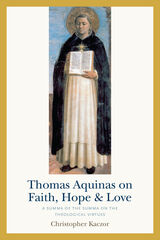
Thomas Aquinas on Faith, Hope, and Love
A Summa of the Summa on the Theological Virtues
Christopher Kaczor
Catholic University of America Press, 2020
Thomas Aquinas on Faith, Hope, and Love is designed to make as easy as possible a first reading of key passages from the Summa theologiae. This book contains selections from the Summa that are most influential, most important, or likely to be most interesting to the contemporary reader. The text of the Summa itself is edited and arranged for beginners. Each article begins with Thomas’s answers to the question at hand and then goes to the first objection, followed by the reply to the first objection, the second objection and its reply, and so on. This arrangement provides a greater accessibility and ease in following the argument. Below the text, copious footnotes illuminate the text as a professor in the classroom might. Some notes provide historical background to figures that Thomas presupposes his reader will know such as Gratian, Dionysius, and Lombard. Other notes offer doctrinal summaries of other parts of the Summa that illuminate what Thomas says about faith, hope, or love. Thomas had an enormous influence on theologians, Church councils, and popes after his time, so some footnotes examine this influence. Thomas drew heavily on sources of wisdom before him, so other footnotes summarize the teachings of earlier authors, such as Aristotle and Augustine. This book also contains introductory essays on the Summa, on faith, on hope, and on love, which provide an overview to situate the reader and place treatment of the theological virtues in its larger context of the Summa. For those who have never read Thomas Aquinas on faith, hope, and love (and for those who teach them), this book provides ready access to the wisdom of the Angelic doctor.
[more]
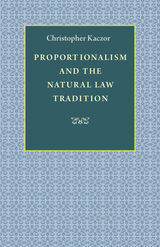
Proportionalism and the Natural Law Tradition
Christopher Kaczor
Catholic University of America Press, 2002
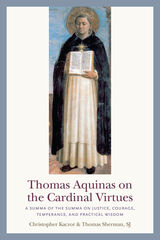
Thomas Aquinas on the Cardinal Virtues
A Summa of the Summa on Prudence, Justice, Temperance, and Courage
Christopher Kaczor
Catholic University of America Press, 2020
Thomas Aquinas on the Cardinal Virtues provides essential passages from Thomas's treatment of the cardinal virtues in the Summa theologiae, edited and explained for classroom use or the independent reader. Arranged for beginners, this book contains passages from the Summa theologiae of great historical import, contemporary relevance, or intrinsic interest combined with abundant footnotes aiding the modern reader. Each individual article is arranged so that the question, e.g. “Is capital punishment moral?” is followed directed by Thomas’s answer. Then the first objection is raised, followed immediately by Thomas’s response, the second objection is raised and then Thomas answers it, and so forth. The abundant footnotes help first time readers navigate key theological and philosophical terms which may be unfamiliar. In addition, the notes provide biographical information about key authors cited by Thomas, such as Tully, Vegetius, and Gregory the Great. The footnotes sometimes look back at the sources and philosophical roots of what Thomas teaches. Other notes note how authors after Aquinas including theologians, church councils, and popes developed, synthesized, and sometimes rejected what Thomas teaches. In sum, this book seeks to illuminate Thomas’s teaching on the cardinal virtues such as a teacher might do in the classroom.
[more]
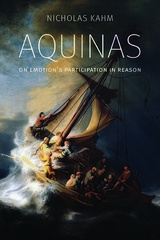
Aquinas on Emotion's Participation in Reason
Nicholas Kahm
Catholic University of America Press, 2019
Aquinas on Emotion’s Participation in Reason aims to present Aquinas’s answer to the perennial and now popular question: In what way can the emotions be rational? For Aquinas, the starting point of this inquiry is Aristotle’s claim (EN. I. 13) that there are three parts to the soul: 1) the rational part, 2) the non-rational part which can participate in reason, and 3) the non-rational part that does not participate in reason. It is the extent to which the second part (the sense appetites, the seat of the emotions) participates in reason that the emotions can become rational. However, immediately after Aristotle introduces his tripartite division of the soul, he warns that one need not delve into the details of the division or the participation. Aquinas, however, ignores Aristotle, and uses his precise metaphysics of participation within in his sophisticated anthropology to great effect in his ethics. Unlike Aristotle, to fully understand Aquinas’s thinking on how the emotions can become rational, we simply must delve into the kinds of precisions that Aristotle thinks are misplaced. When Aquinas’s views emerge from these precisions, he has a surprisingly level-headed and commonsense view of how the emotions can become rational. On this point, he is more pessimistic than Aristotle and more optimistic than Kant; he is certainly not, as is he is often thought to be, the faithful follower of Aristotle and the polar opposite of Kant. Nicholas Kahm argue that Aquinas has a realistic and plausible view of how far reason can go in shaping our emotions. Furthermore, his plausible views can accommodate the serious current challenge raised against virtue ethics from social psychology. The method has mainly been a careful reading of primary texts, but unlike the rest of the scholarship on Aquinas’s ethics, Kahm is particularly sensitive to Aquinas’s historical and philosophical development.
[more]
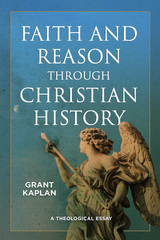
Faith and Reason through Christian History
A Theological Essay
Grant Kaplan
Catholic University of America Press, 2022
It is impossible to understand the history of Christian theology without taking into account the relationship between faith and reason. Many works give an overview of faith and reason, or outline key principles, while others put forward a thesis about how one should understand the relationship between faith and reason. In this theological essay, Grant Kaplan revisits the key figures and debates that shape how faith and reason relate. Divided into three parts, Kaplan invites readers into a conversation rather than a drive-by. Readers will encounter the words and arguments of some of Christianity’s greatest thinkers, some well-known (Augustine, Aquinas, Newman) and others nearly forgotten. Readings of these figures bring them to life in an accessible manner.
In Faith and Reason through Christian History, the roughly fifty figures treated are given sufficient room to breathe. Rather than simply summarizing their thought, Kaplan traces their arguments through key texts. This book will appeal to a range of audiences: theologians and philosophers, instructors, graduate students, seminarians, lay study groups, and undergraduate theology majors. No book today accomplishes what this book does!
[more]
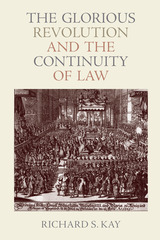
The Glorious Revolution and the Continuity of Law
Richard S. Kay
Catholic University of America Press, 2014
The Glorious Revolution and the Continuity of Law explores the relationship between law and revolution. Revolt - armed or not - is often viewed as the overthrow of legitimate rulers. Historical experience, however, shows that revolutions are frequently accompanied by the invocation rather than the repudiation of law. No example is clearer than that of the Glorious Revolution of 1688-89. At that time the unpopular but lawful Catholic king, James II, lost his throne and was replaced by his Protestant son-in-law and daughter, William of Orange and Mary, with James's attempt to recapture the throne thwarted at the Battle of the Boyne in Ireland. The revolutionaries had to negotiate two contradictory but intensely held convictions. The first was that the essential role of law in defining and regulating the activity of the state must be maintained. The second was that constitutional arrangements to limit the unilateral authority of the monarch and preserve an indispensable role for the houses of parliament in public decision-making had to be established. In the circumstances of 1688-89, the revolutionaries could not be faithful to the second without betraying the first. Their attempts to reconcile these conflicting objectives involved the frequent employment of legal rhetoric to justify their actions. In so doing, they necessarily used the word "law" in different ways. It could denote the specific rules of positive law; it could simply express devotion to the large political and social values that underlay the legal system; or it could do something in between. In 1688-89 it meant all those things to different participants at different times. This study adds a new dimension to the literature of the Glorious Revolution by describing, analyzing and elaborating this central paradox: the revolutionaries tried to break the rules of the constitution and, at the same time, be true to them.
[more]
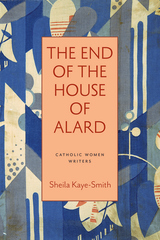
The End of the House of Alard
Sheila Kaye-Smith
Catholic University of America Press, 2022
The Catholic University of America Press is pleased to present the second volume in our Catholic Women Writers series, which will attempt to bring new attention to prose work of Catholic women writers from the 19th and 20th centuries. Sheila Kaye-Smith was a best selling author who had published over 50 books in her lifetime, few of which remain in print since her death in 1956.
The End of the House of Alard (1922) documents the choices made by the final generation of the aristocratic Alard family and the ways in which they, both willingly and reluctantly, bring the long line of their ancestral blood to a complete and sudden end. For some of them, the end of the Alard line is as painful to enact as it is for others to witness; for others it is welcomed as a necessary modernization or a true realignment toward religious integity and universal human truth. Some of the family's children yearn for individual liberty; others have it forced upon them. But none of them can find it under the burden of the Alard name and its crumbling estate. The End of the House of Alard is a novel about the human need for purpose, for a truth by which to live and for which to die. It is a novel about faith and idolatry, love and death, freedom and bondage, nature and grace. Put another way, it is about how human beings cannot escape the great challenge of salvation, of breaking free from false, man made gods in order to unite instead with the divine love of Christ. The novel's characters span a breadth of options on this spectrum and their various outlooks on life continue to reflect those available to us today.
[more]
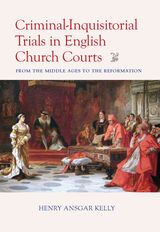
Criminal-Inquisitorial Trials in English Church Trials
From the Middle Ages to the Reformation
Henry Ansgar Kelly
Catholic University of America Press, 2023
After inquisitorial procedure was introduced at the Fourth Lateran Council in Rome in 1215 (the same year as England’s first Magna Carta), virtually all court trials initiated by bishops and their subordinates were inquisitions. That meant that accusers were no longer needed. Rather, the judges themselves leveled charges against persons when they were publicly suspected of specific offenses—like fornication, or witchcraft, or simony. Secret crimes were off limits, including sins of thought (like holding a heretical belief). Defendants were allowed full defenses if they denied charges. These canonical rules were systematically violated by heresy inquisitors in France and elsewhere, especially by forcing self-incrimination. But in England, due process was generally honored and the rights of defendants preserved, though with notable exceptions.
In this book, Henry Ansgar Kelly, a noted forensic historian, describes the reception and application of inquisition in England from the thirteenth century onwards and analyzes all levels of trial proceedings, both minor and major, from accusations of sexual offenses and cheating on tithes to matters of religious dissent. He covers the trials of the Knights Templar early in the fourteenth century and the prosecutions of followers of John Wyclif at the end of the century. He details how the alleged crimes of “criminous clerics” were handled, and demonstrates that the judicial actions concerning Henry VIII’s marriages were inquisitions in which the king himself and his queens were defendants. Trials of Alice Kyteler, Margery Kempe, Eleanor Cobham, and Anne Askew are explained, as are the unjust trials condemning Bishop Reginald Pecock of error and heresy (1457-59) and Richard Hunne for defending English Bibles (1514). He deals with the trials of Lutheran dissidents at the time of Thomas More’s chancellorship, and trials of bishops under Edward VI and Queen Mary, including those against Stephen Gardiner and Thomas Cranmer. Under Queen Elizabeth, Kelly shows, there was a return to the letter of papal canon law (which was not true of the papal curia). In his conclusion he responds to the strictures of Sir John Baker against inquisitorial procedure, and argues that it compares favorably to the common-law trial by jury.
[more]
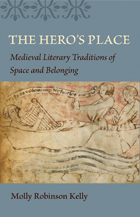
The Hero's Place
Medieval Literary Traditions of Space and Belonging
Molly Robinson Kelly
Catholic University of America Press, 2009
The Hero's Place presents an innovative study of how the spaces described in a literary work contribute dynamically and profoundly to that work's meaning.
[more]
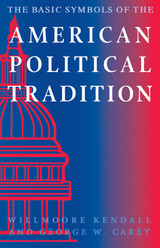
The Basic Symbols of the American Political Tradition
Willmoore Kendall
Catholic University of America Press, 1995
This thought-provoking book contributes important arguments to the fundamental debate over the place of equality in our political self-understanding. It will continue to be of immense interest to all serious students of American political thought.
[more]
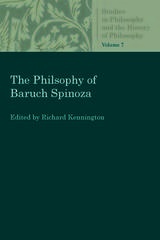
The Philosophy of Baruch Spinoza
Richard Kennington
Catholic University of America Press, 2018
This volume is a collection of articles that looks at the work of Baruch Spinoza through his metaphysics, his philosophy of politics and religion, and alternative approaches to Spinoza.
[more]
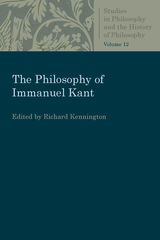
The Philosophy of Immanuel Kant
Richard Kennington
Catholic University of America Press, 2018
A collection devoted to mark the bicentennial of the publication of Kant's Critique of Pure Reason.
[more]
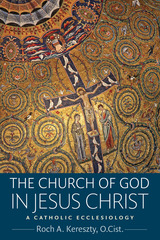
The Church of God in Jesus Christ
A Catholic Ecclesiology
Roch A. Kereszty
Catholic University of America Press, 2019
Investigating Vatican II is a collection of Fr. Jared Wicks’ recent articles on Vatican II, and presents the Second Vatican Council as an event to which theologians contributed in major ways and from which Catholic theology can gain enormous insights. Taken as a whole, the articles take the reader into the theological dynamics of Vatican II at key moments in the Council’s historical unfolding. Wicks promotes a contemporary re-reception of Vatican II’s theologically profound documents, especially as they featured God’s incarnate and saving Word, laid down principles of Catholic ecumenical engagement, and articulated the church’s turn to the modern world with a new “face” of respect and dedication to service. From the original motivations of Pope John XXIII in convoking the Council, Investigating Vatican II goes on to highlight the profound insights offered by theologians who served behind the scenes as Council experts. In its chapters, the book moves through the Council’s working periods, drawing on the published and non-published records, with attention to the Council’s dramas, crises, and breakthroughs. It brings to light the bases of Pope Francis’s call for synodality in a listening church, while highlighting Vatican II’s mandate to all of prayerful biblical reading, for fostering a vibrant “joy in the Gospel.”
[more]
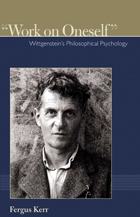
"Work on Oneself"
Wittgenstein's Philosophical Psychology (Institute for the Psychological Sciences Monograph Series, Volume 1)
Fergus Kerr
Catholic University of America Press, 2008

Canonical Collections of the Early Middle Ages (ca. 400-1400)
Lotte Kery
Catholic University of America Press, 1999
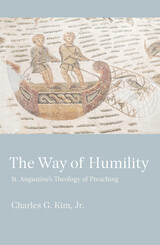
The Way of Humility
St. Augustine's Theology of Preaching
Charles J. Kim
Catholic University of America Press, 2023
For Augustine, that the Word became flesh transformed a merely human understanding of the virtues and grounds all virtue in humility. The Way of Humility: Augustine’s Theology of Preaching explores how this truth became a new paradigm for understanding the scriptures and thus, how Augustine embodied the virtue in the preaching of the scriptures. One of Augustine’s most devoted students, Possidius, said that anyone can learn from reading Augustine, but “those were able to profit still more who could hear him speak in church and see him with their own eyes. Truly, he was indeed one of those of whom it is written, ‘speak this way and act the same way.’” The Way of Humility searches for evidence of the virtue of humility in action through the preaching of the humble Word in the sermons of Augustine.
Many know of Augustine through his more famous treatises but few have encountered the Doctor of Grace where he had his most immediate impact, preaching. The Way of Humility follows the sermons through several traditional theological loci, ecclesiology, Christology, soteriology to uncover what can be learned about Augustine’s theology through the way he preached to a mixed audience of urbanites and rustics, many of whom did not have the benefit of a formal education. Throughout the book, we see the interplay between Augustine’s action in speech and Augustine’s more direct statements on his theology of Preaching. Through handing over Christ in his sermons, he became himself an example of humility for the congregation on their journey toward the final end for all people, the Beatific Vision.
[more]
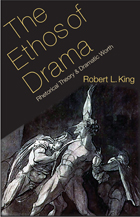
The Ethos of Drama
Rhetorical Theory and Dramatic Worth
Robert L. King
Catholic University of America Press, 2010
For the first time in the history of drama criticism this book uses traditional rhetorical theory to evaluate moral values in plays from Shakespeare's time to the present
[more]
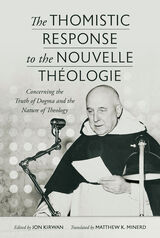
The Thomistic Response to the Nouvelle Theologie
Concerning the Truth of Dogma and the Nature of Theology
Jon Kirwan
Catholic University of America Press, 2023
The Thomistic Response to the Nouvelle Théologie: Concerning the Truth of Dogma and the Nature of Theology retrieves the most important and largely forgotten exchanges in the mid-20th-century debate surrounding ressourcement thinkers. It makes available new translations of works by the leading Thomists in the exchange: Dominican Fathers Reginald Garrigou-Lagrange, Michel Labourdette, Marie-Joseph Nicolas, and Raymond Bruckberger. In addition to a lengthy historical and theological introduction, the volume contains sixteen articles, thirteen of which have never appeared in English. All the major critical responses of the Dominican Thomists to the nouvelle théologie are here presented chronologically according to the primary debates carried on, respectively, in the journals Revue Thomiste and Angelicum. A lengthy introduction describes the unfolding of the entire debate, article by article, and explains and references the ressourcement interventions.
Unfortunately, the history of this important debate is largely surrounded by polemics, half-truths, caricatures, and journalistic soundbites. In the articles gathered in this volume, along with the accompanying introduction, the Toulouse and Roman Dominicans speak in their own voice. The central theses that define the two sides of the debate are sympathetically set forth. However, the texts gathered here show the immense lengths to which the Thomists went to initiate an authentic and fraternal theological dialogue with the nouveaux théologiens. Frs. Labourdette and Nicolas repeatedly argued for the importance of ressourcement work: they applauded its historical efforts, and they were generally sympathetic and complementary (although always pointed and persistent in gently expressing their concerns). Even Fr. Garrigou-Lagrange—whose infamous intervention is remembered as being a theological “atomic bomb”—is revealed as being no more guilty of escalation than the Dominicans’ interlocutors in their own responses to him and Fr. Labourdette.
This volume will greatly aid in the task of theological and historical reconstruction and will, undoubtedly, assist in a certain rapprochement between the two sides, as the essential texts, concerns, and theological arguments are made available in their entirety to professional and lay anglophone readers.
[more]
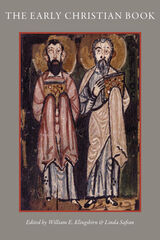
The Early Christian Book (CUA Studies in Early Christianity)
William E. Klingshirn
Catholic University of America Press, 2007
Written by experts in the field, the essays in this volume examine the early Christian book from a wide range of disciplines: religion, art history, history, Near Eastern studies, and classics.
[more]
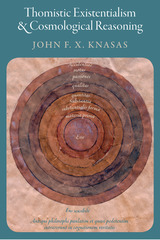
Thomistic Existentialism and Cosmological Reasoning
John F. X. Knasas
Catholic University of America Press, 2019
Cosmological reasoning is an important facet of classical arguments for the existence of God, but these arguments have been subject to many criticisms. The thesis of this book is that Thomas Aquinas can dodge many of the classic objections brought against cosmological reasoning. These objections criticize cosmological reasoning for its use of the Principle of Sufficient Reason; its notion of existence as a predicate; its use of ontological reasoning; its reliance on sense realism; its ignoring of the problem of evil; and its susceptibility to the critique of "ontotheology" as famously put forward by Heidegger. Secondly, the book proposes that the kind of reasoning found in Aquinas's De Ente can be formulated in a more robust version. Prompted by Aquinas’s admissions that philosophical knowledge of God is the prerogative of metaphysics, the second main portion of the book extensively illustrates how the more robust version of the De Ente is the interpretive key for Aquinas’s many arguments for God. Hence, the book should be of interest both to philosophers engaged in cosmological reasoning discussion and to Thomists interested in understanding Aquinas’s viae to God. Finally, the deep purpose of the book is to reawaken interest in Thomistic Existentialism, an interpretation of Aquinas that flourished in the 1950's in the works of Etienne Gilson, Jacques Maritain, and Joseph Owens. In this interpretation, a particular thing’s existence is the actuality of the thing in the sense of a distinctive actus not translatable into something else, for example, the fact of the thing or the thing having form. This book clearly explains how this interpretation looks at Thomas's metaphysics, and why it helps illuminate metaphysical realities.
[more]
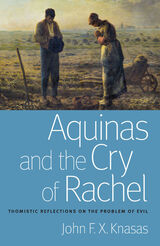
Aquinas and the Cry of Rachel
John F.X. Knasas
Catholic University of America Press, 2013
In Aquinas and the Cry of Rachel , John F. X. Knasas explores Thomas Aquinas's philosophical thinking about evil, and brings the results into discussion with the contemporary theodicies - philosophies of the problem of evil. It examines the relation of the human person and human nature to nature as a whole.
Generally speaking, possible philosophical accounts for evil are two kinds: cosmological or personal. The cosmological account has evils rebounding to the perfection of creation. The personal account would have evils suffered rebounding to the good of the sufferer. Knasas argues that for Aquinas no philosophical resolution of these two kinds of accounts
is possible. This argument is based upon Aquinas's understanding of the human as an intellector of analogical being. Such an understanding establishes two truths. First, the human is by nature only a principal part of the created whole. Second, there is the philosophically discernible possibility of supernatural elevation by the creator.
Hence, as far as philosophy can discern, evil may have a natural explanation or it may have a supernatural one. The Thomistic philosopher has no answer as to why evil exists because that philosopher discerns too many possible ones. In that respect, Aquinas's thinking on evil is similar to his thinking about the philosophical knowledge of the biblical
truth of the world's creation in time. Such a creation is one metaphysical possibility among others. Some authors that Aquinas and the Cry of Rachel considers are: Anthony Flew and Albert Camus, Jacques Maritain and Charles Journet, William Rowe, Marily McCord Adams, William Hasker, John Hick, David Ray Griffin, David Hume, Diogenes Allen, J. L. Mackie, Alvin Plantinga, Richard Swinburne, Bruce Reichenbach,
Brian Davies, and Eleonore Stump.
Generally speaking, possible philosophical accounts for evil are two kinds: cosmological or personal. The cosmological account has evils rebounding to the perfection of creation. The personal account would have evils suffered rebounding to the good of the sufferer. Knasas argues that for Aquinas no philosophical resolution of these two kinds of accounts
is possible. This argument is based upon Aquinas's understanding of the human as an intellector of analogical being. Such an understanding establishes two truths. First, the human is by nature only a principal part of the created whole. Second, there is the philosophically discernible possibility of supernatural elevation by the creator.
Hence, as far as philosophy can discern, evil may have a natural explanation or it may have a supernatural one. The Thomistic philosopher has no answer as to why evil exists because that philosopher discerns too many possible ones. In that respect, Aquinas's thinking on evil is similar to his thinking about the philosophical knowledge of the biblical
truth of the world's creation in time. Such a creation is one metaphysical possibility among others. Some authors that Aquinas and the Cry of Rachel considers are: Anthony Flew and Albert Camus, Jacques Maritain and Charles Journet, William Rowe, Marily McCord Adams, William Hasker, John Hick, David Ray Griffin, David Hume, Diogenes Allen, J. L. Mackie, Alvin Plantinga, Richard Swinburne, Bruce Reichenbach,
Brian Davies, and Eleonore Stump.
[more]
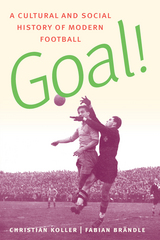
Goal!
Christian Koller
Catholic University of America Press, 2015
Goal! covers the history of the beautiful game from its origins in English public schools in the early 19th century to its current role as a crucial element of a globalized entertainment industry. The authors explain how football transformed from a sport at elite boarding schools in England to become a pastime popular with the working classes, enabling factories such as the Thames Iron Works and the Woolwich Arsenal to give birth to the teams that would become the Premier League mainstays known as West Ham United and Arsenal. They also explore how the age of amateur soccer ended and, with the advent of professionalism, how football became a sport dominated by big clubs with big money and with an international audience.
[more]

Mother Teresa
Just a Pencil In God's Hand: Reflections in Honor of a Saint
Brian Kolodiejchuk
Catholic University of America Press, 2024
This anthology contains a collection of intellectual explorations honoring the enduring legacy of Mother Teresa. The symposium, held on 10 September 2022 at the Catholic University of America (CUA), brought together leading scholars to speak of Mother Teresa's legacy to produce the following papers, each shedding light on a life characterized by compassion, selflessness, and devoted service to the poorest of the poor, the forgotten, and the outcast of society.
The keynote address by George Weigel, “Mother Teresa and John Paul II: Lessons for Our Troubled Times,” uncovers the lessons from the partnership of two great saints and their efforts to make way for Love in a dark world. "Mother Teresa: Holiness, Process of Canonization, and Miracle;" by the postulator of her cause, Fr. Brian Kolodiejchuk, MC, explores the nature of holiness, several characteristics of Mother Teresa’s holiness and the process that led to her canonization in 2016. In “Praxiological Approach to the Poor: Mother Teresa’s authentic retrieval of Christian praxis through faith, hope, and charity,” presented by Fr Darren Dentino, MC, we delve into Mother Teresa’s profound relationship with the underprivileged, showcasing a service approach that transcends simple social work and touches and heals the physical and inner wounds of many.
Janice Breidenbach, a professor at Ave Maria University, sheds light on her own experience as a mother and explains Mother Teresa’s deep understanding of motherhood in her paper “Mother Teresa’s Philosophy of Motherhood.” "Mother Teresa: A Carmelite Perspective" by CUA professor, Fr Stephen Payne, OCD, explores the connections between Mother Teresa and the Carmelite tradition, highlighting the influence of Carmelite spirituality on her life and journey. Jim Towey's paper delves into Mother Teresa's motherhood and her humanity, emphasizing how her ordinary yet profound acts of love and compassion were reflective of her saintly character.
In the annual conference held the following year, Catholic University of America professor Bradley Gregory, examines the phrase “you did it to me” from the judgment scene in the gospel of Matthew (25:40) which Mother Teresa would refer to as “the gospel on five fingers.” Drawing on the rich theological resources of Scripture and the Church’s tradition, Professor Bradley expounds on how this passage relates to the gospel of grace, which calls us into God’s work of redeeming and healing the world.
Each paper testifies to Mother Teresa’s enduring legacy as a reflection of God’s love in the world, providing readers an opportunity to contemplate her steadfast dedication and honor the legacy of one of the 20th century's most profound figures.
[more]

Mother Teresa's General Letters to Her Sisters
Brian Kolodiejchuk
Catholic University of America Press, 2024
Mother Teresa’s General Letters to Her Sisters is a collection of Mother Teresa’s circular letters to the members of her religious congregation, the Missionaries of Charity Sisters. Not intended for those outside her community, they were written informally and spontaneously, often with little editing. It was for Mother Teresa a way of “being present” to the members of her rapidly expanding religious order. Seemingly of little interest except for those to whom they were addressed, the letters reveal the spiritual depth and pragmatic leadership of one of the most popular modern saints, as well as the inner dynamics underlying one of the most flourishing religious congregations of the last century. At the same time, and perhaps surprisingly, these letters may also prove to be worthwhile reading for a wider audience.
Something of God’s wisdom and love seems to shine through Mother Teresa’s guidance and counsels, giving the reader light and help even though he or she is not living the same religious life as one of the Sisters. Mother Teresa’s unpolished statements are at times humble and at times humbling. They inspire confidence and encourage generosity. Many a time they are humorous but more often challenging. They are sprinkled with serene joy but also permeated with deep pain. She delighted in her Sisters’ accomplishments yet did not shy away from correcting even the smallest flaw, which didn’t escape her very observant eye. Sometimes she sounded just like a mother, full of tender loving care, and at other times more like a commander in chief, exhibiting an iron will and uncompromising determination. In either case, her followers seemed to have been drawn into the mystery of her charism, endeavoring to keep pace with her. Was it the attraction of what could be termed as her “leadership style” in the unremitting service of the poorest of the poor, or the perceived love of a mother’s heart that made her so unanimously loved and admired by the members of her congregation? Or was it both? The letters will reveal the answer!
Inspiring in their simplicity, the letters may well serve as a treasure trove where anyone from a reflective scholar to a caring mother of a family may find satisfaction for their spiritual palate. The attractiveness of perennial truth often makes Mother Teresa’s presentation of traditional spiritual themes likewise relevant for contemporary needs. In the context of Mother Teresa’s statement that “we are created for greater things, to love and to be loved’,” these letters will help the reader discover and experience God’s presence through the little miracles of His love in one’s daily life. They will inspire us “to put our love into living action,” sharing His love with all those we meet, and so make our lives “something beautiful for God.”
[more]
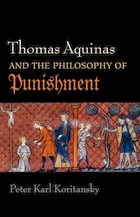
Thomas Aquinas and the Philosophy of Punishment
Peter Karl Koritansky
Catholic University of America Press, 2012
Thomas Aquinas and the Philosophy of Punishment explores how Aquinas's understandings of natural law and the common good apply to the contemporary philosophical discussion of punitive justice.
[more]
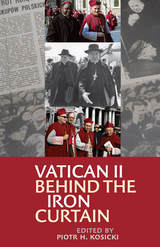
Vatican II Behind the Iron Curtain
Piotr H. Kosicki
Catholic University of America Press, 2016
The goal of this volume is to begin writing Central and Eastern Europe back into the story of the Second Vatican Council, its origins, and its consequences. This volume assembles - for the first time in any language - a broad overview of the place of four different Communist-run countries - Czechoslovakia, Hungary, Poland, and Yugoslavia - in the story of the Council. Framing these is an account of how the Cold War impacted the Council and its reception. The book engages with both English-language scholarship and the national historiographies of the countries that it examines, offering a global lens on the present state of research (covering all relevant languages) and seeking to propel that research forward. All of the chapters draw on both non-English secondary literature and original primary sources - some published, some archival.
[more]
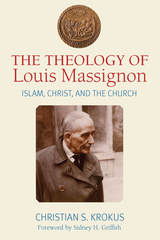
The Theology of Louis Massignon
Christian Krokus
Catholic University of America Press, 2017
In The Theology of Louis Massignon, author Christian Krokus argues that Louis Massignon’s achievements in Christian-Muslim understanding, his activism on behalf of Muslim immigrants, refugees, and Middle Eastern Christians, as well as his developing understanding of Islam must be understood in the light of his Catholic convictions in relation to God, Christ, and the Church. With ample references to primary works, many translated into English for the first time, Krokus offers a comprehensive account of the main points of Massignon’s religious thought that will prove essential to theologians and historians working on questions of Christian-Muslim dialogue, comparative theology, and religious pluralism.
[more]
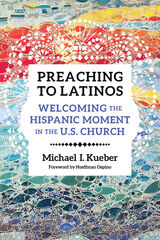
Preaching to Latinos
Welcoming the Hispanic Moment in the U.S. Church
Michael Kueber
Catholic University of America Press, 2022
There is a wide and growing gap in the Catholic Church in the United States between the clergy, who are mostly of European descent, and the large percentages of Catholics who identify as Latinos. While the US Church has made a concerted effort to build Hispanic ministries, many clergy and lay ministers are still ill-equipped to understand the cultural background of their parishioners, especially the large numbers who are foreign born. Because of this disconnect, the Church risks missing "the Hispanic Moment" in the US Church, in which the faith and traditions of these newest waves of US immigration could not just exist in parallel to English-language congregations, but enrich and enliven the faith of the whole community while passing on the faith to subsequent generations.
Learning Spanish--while helpful--is not enough. There are intercultural competencies that can only be developed through practice, but it also helps already-busy clergy to have a concise guide. In addition to knowing the scholarly literature on cross-cultural preaching and Hispanic culture, Father Michael Kueber has twenty years of experience serving first generation Hispanic immigrants and their second generation children. In Preaching to Latinos, Kueber provides the readers with best practices for preaching to and leading their churches. As a member of an ecumenical community, he is able to speak to members of all Christian denominations.
[more]
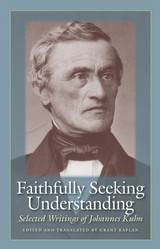
Faithfully Seeking Understanding
Selected Writings of Johannes Kuhn
Johannes Kuhn
Catholic University of America Press, 2009
Faithfully Seeking Understanding provides a first-hand opportunity for English-speaking readers to encounter the thought of Johannes Kuhn (1806-1887), widely considered the greatest speculative theologian of the renowned Catholic Tübingen School.
[more]
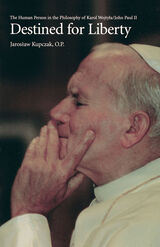
Destined for Liberty
The Human Person in the Philosophy of Karol Wojtyla/John Paul II
Jaroslaw Kupczak, O.P.
Catholic University of America Press, 2000
In this compelling new work, Jaroslaw Kupczak, O.P., presents a complete introduction to John Paul II's theory of the human person
[more]
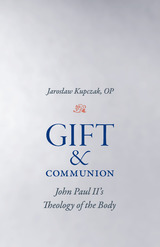
Gift and Communion
Jaroslaw Kupczak
Catholic University of America Press, 2014
Gift and Communion offers a critical presentation of John Paul II's theology of the body, understood in the light of Christian theological tradition. The main thesis of the book is that John Paul II's theology of the body forms a new, inspiring approach to Christian ethics and the theology of marriage and family, as well as to theological anthropology. A central thrust of Gift and Communion is to treat theology of the body - as it deserves - in all its philosophical and theological seriousness and to present it as an important stage in the historical development of Catholic theology
[more]
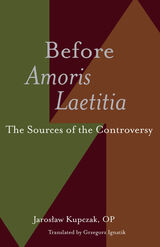
Before Amoris Laetitia
The Sources of the Controversy
Jaroslaw Kupczak
Catholic University of America Press, 2021
The publication of Pope Francis’ post-synodal apostolic exhortation, Amoris Laetitia started the most important theological debate in the Catholic Church since the end of the Second Vatican Council. The cardinals, bishops, theologians, priests, lay Catholics found themselves on the opposite sides of this crucial and complicated discussion. This book attempts to shed some light on this debate by tracing its genealogy.
Since Amoris Laetitia is a post-synodal document, the large part of the book is devoted to the theological analysis of the two Synods of Bishops convoked by Pope Francis in the first years of his pontificate: the extraordinary in October 2014 and the ordinary that took place a year later. The main topics for the two synods were determined, however, in the speech given by Cardinal Walter Kasper during the cardinals consistory in February 2014 whose main aim was to prepare the possibility of admitting divorced persons who live in second unions to Holy Communion. The arguments of Cardinal Kasper are presented in the first chapter of the book and confronted with the most significant statements of the Magisterium of the Church on the issue of admittance to the Holy Communion.
This book is a study at the intersection of Church history, the history of theology, and systematic theology: dogmatic and moral. Kupczak is interested in the chronology of the events connected to the two synods on the family but in the context of theological problems discussed therein: the theological significance of contemporary cultural changes; the relation of the Church to the world; the understanding of the indissolubility of the sacramental marriage and the Eucharist; the methods of ethically assessing human acts, particularly the concept of so-called intrinsically evil acts (intrinsece malum); and the relation of conscience to the general moral norm. The non-partisan ambition of this book is to serve as a “road map”— a help in navigation for the reader in the complicated discussions leading to publication of Amoris Laetitia.
The uniqueness of this book consists in combining the historical analysis of the events leading to the publication of Amoris Laetitia with research of the theological discussion that ensued. Since Amoris Laetitia is a post-synodal exhortation, this book rests on the assumption that crucial for its understanding is a thorough analysis of its genealogy. Only in the light of this historical and theological perspective the debates surrounding Amoris Laetitia may be understood.
[more]
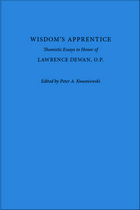
Wisdom's Apprentice
Thomistic Essays in Honor of Lawrence Dewan, O.P.
Peter A. Kwasniewski
Catholic University of America Press, 2007
In Wisdom's Apprentice, twelve distinguished scholars pay grateful homage to their friend and mentor in recognition of his extraordinary contributions to the study of the philosophia perennis
[more]
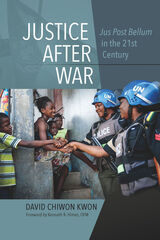
Justice After War
Jus Post Bellum in the 21st Century
David Chiwon Kwon
Catholic University of America Press, 2023
Justice After War is aimed especially to both undergraduate and graduate students, as well as the general audience who want to understand the significance of a recent development within the just war tradition, namely, the increasing attention given to the category of jus post bellum (postwar justice and peace). While examining the interrelated challenges of moral and social norms in both political and legal domains, as well as church practices, this work proposes an innovative methodology for linking theology, ethics, and social science so that the ideal and the real can inform each other in the ethics of war and peacebuilding. The main task of this project, then, is to identify what the author views as three key themes of jus post bellum, and three practices that are essential to implementing jus post bellum immediately after a war: just policing, just punishment, and just political participation.
David Kwon endeavors to challenge the view of those who suggest that reconciliation, mainly political reconciliation, is the foremost ambition of jus post bellum. Instead, he attempts to justify the proposition that achieving just policing, just punishment, and just political participation are essential to building a just peace, a peace in which the fundamental characteristic must be human security. It thus demonstrates that human security is an oft-neglected theme in the recent discourse of moral theologians and that a more balanced understanding of jus post bellum will direct attention to the elements composing human security in a postwar context.
[more]
READERS
Browse our collection.
PUBLISHERS
See BiblioVault's publisher services.
STUDENT SERVICES
Files for college accessibility offices.
UChicago Accessibility Resources
home | accessibility | search | about | contact us
BiblioVault ® 2001 - 2024
The University of Chicago Press









